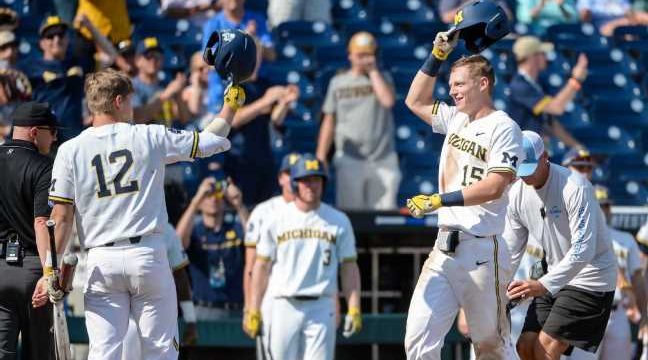OMAHA, Neb. — Gerald Ford’s birthplace doesn’t usually draw a lot of foot traffic. Most people don’t even know the place exists, save for Omaha natives who were marched there on elementary school field trips. Besides, Ford lived there only a couple of weeks. He was born in his grandparents’ basement, then moved to Michigan with his family.
But there it sits, only a few miles south of TD Ameritrade Park, a stately brick building that is opened to visitors by appointment only but with a white column-lined garden that is open 24 hours a day. Normally, the bronze bust of the 38th president of the United States spends its days watching intermittent joggers and dog walkers.
But on this rainy Sunday afternoon, barely 24 hours from the start of the College World Series finals, that bust was surrounded by a family of seven, dressed in blue and posing for selfies with President Ford’s face and the nearby photo of No. 48, the All-American center about to snap the football for the 1933 Michigan Wolverines football team.
“I can’t believe this is here in Omaha, Nebraska,” said Detroit resident Teresa McDonnell, her Block M rain jacket rustling as she rubbed Ford’s head for good luck.
“Hell,” her husband, Tim, replied, “I can’t believe we are in Omaha, Nebraska.”
Every year, the eight-team College World Series field contains at least one feel-good, didn’t-see-them-coming underdog story. From Hawaii and The Citadel to Pepperdine and Creighton to Fresno State and Coastal Carolina.
This year’s edition is Michigan. Yes, the school in Ann Arbor with the Big House and the Fab Five and the “Hail to the Victors” and the $196.3 million in projected athletic revenue, a true anchor school of a Power 5 conference.
So, the Wolverines as a Cinderella? Yes, it feels weird. But it’s also a fact.
Before this month, Michigan baseball had only one previous NCAA super regional appearance, an 0-2 exit a dozen years ago. Before two weeks ago, Michigan hadn’t made it to Omaha since 1984, when Hall of Famer Barry Larkin was in the infield. Before this week, the Wolverines hadn’t made it to the College World Series finals since 1962.
They won the title that year, their second. Four years later, archrival Ohio State won it all. Since then, until this week no Big Ten team had even played for a national baseball championship, let alone won it. When Indiana made the CWS field in 2013, it was the first Big Ten team to be among the final eight standing since Michigan ’84, and Michigan ’19 is the first Big Ten team to be here since.
The Wolverines barely squeaked into this year’s 64-team postseason field, the equivalent of a double-digit seed in the NCAA basketball tournament. They started the tournament with 200-1 odds to win it all. When they arrived in Omaha a week and a half ago, the newspapers, websites and TV stations that cover them back home didn’t bother to send any of their Michigan beat writers and reporters because the assumption was that the team wouldn’t be in Omaha long enough to justify the cost of the coverage.
Those media members started frantically blowing into Nebraska over the weekend, as did former Michigan players and program supporters — including the McDonnell family of Detroit — eager to climb aboard the most unexpected of College World Series bandwagons.
So yeah, the Michigan Wolverines, wearers of the glass slipper with cleats, aren’t offended by that portrayal at all. Hey, if the shoe fits …
“We certainly don’t look at ourselves as some sort of Cinderella story,” said head coach Erik Bakich, who’s in his seventh season. “These guys believe they should be here. I think if you’ve really watched them over the last month, you’ve seen that attitude develop. They just want to play ball, and they want to do it together as long as they can. Every win is one more day that they get to stay together. That’s the goal they’re focused on, not where we are or who we’re playing or what people think of our chances. Because of that, they aren’t intimidated by Omaha or anywhere else.”
That’s been clear from the first pitch of their postseason run, which began in Omaha one month ago with five games in the Big Ten tournament; moved on to the NCAA Corvallis Regional, home of defending national champion Oregon State; the Los Angeles Super Regional, hosted by longtime No. 1-ranked UCLA; and then back to Omaha for the CWS, where Michigan has ended the career of Florida State’s legendary coach Mike Martin and defeated No. 8 national seed Texas Tech.
That’s 12,000 miles of travel. Monday’s game (7 p.m. ET on ESPN) marks the Wolverines’ 16th in 34 days, against Vanderbilt, the No. 2 national seed and an Omaha regular.
It’s been a wild summer run of impossible odds against storied opponents on hallowed grounds, all while stuck in an M.C. Escher-ish world of endless hotel rooms and buses.
And they have totally dug it all.
“When you make the decision to play baseball at a midwestern or northern school, you had better be ready to do spend some time away from home, so this hasn’t really been a big deal for us,” Michigan senior first baseman Jimmy Kerr said.
“We started the season with 13 games in Florida, California and South Carolina, and then when we finally had a homestand in mid-March, it was all messed up because of weather. So, yeah, that’s a lot of time on the road. A group is either going to come together during that, or they are going to want to kill each other. We came together, especially over the last month. I wouldn’t trade it for anything in the world. That’s why I came here even though I grew up in Scottsdale.”
Yes, Arizona, one of the longtime cornerstone states of producing College World Series participant teams, along with California, Texas, Florida and others located throughout the southeastern Sun Belt. But Kerr’s childhood goal was always to don the maize and blue, because he’s a Wolverines legacy kid. That previous Michigan team to make it to Omaha back in ’84? Kerr’s father, Derek, was a backup catcher on that roster with Larkin and Chris Sabo.
That last Michigan team to win the College World Series title back in ’62? Kerr’s grandfather John was the iron-armed pitcher who powered that team to Rosenblatt Stadium by winning back-to-back games in the regionals, throwing more than 300 pitches. Jimmy Kerr walked on at Michigan four years ago, welcomed by Bakich largely because of the history that came with the name on the back of the kid’s jersey. For three years, he was like his father, also a walk-on, and was a solid backup role player.
Now he has become the kind of hero his grandfather was in ’62, slugging 14 home runs this season, including two in Friday’s 15-3 semifinal rout of Texas Tech. Now he is the embodiment of what this Michigan team, season and story have become.
“If I am being honest, when I decided to go to Michigan, the goal was to win a Big Ten championship and that was it,” Kerr confessed. “But once I got there and saw the guys and I saw how committed Coach Bakich was and the way we worked every day, I realized that there was no reason why we couldn’t go beyond that. We knew we could do it, no matter where we are located or how cold it is. It was time to get rid of the excuses everyone has always had for not getting to Omaha.”
Kerr sounds like Bakich, who has spent this entire postseason run repeating that same mantra about not allowing the so-called “cold weather curse” to become an excuse to always climb into the back seat of a sport driven by Southern schools, specifically the SEC, the conference home of Michigan’s national championship foe, Vanderbilt. The SEC has made 103 College World Series appearances, including half of this year’s field. The Big Ten has made 29. When Vandy takes the field Monday night, it will be the 11th time in 12 seasons the conference has had at least one of the two teams in the finals.
But this is a new age of college baseball, as evidenced by this year’s four semifinalists. Michigan was joined by Louisville, Texas Tech and Vanderbilt, who have 13 CWS appearances among them, but all but one of those berths were earned over the past eight years. All three of those programs toiled in irrelevancy for decades. Now they are the teams who have dominated the past decade, and unseated a roster of longtime college baseball powerhouses to do it.
That gives hope to programs like Michigan. The team that the would-be resurrected point to as their inspiration is Vanderbilt and what the Commodores have accomplished over the past eight seasons, with four CWS appearances with one title and one runner-up finish. The man who has pulled off that Lazarus trick is head coach Tim Corbin.
“What Tim has done at Vanderbilt has become the model for all of us who were challenged with creating a winning baseball program at places that might have struggled for a while,” Texas Tech head coach Tim Tadlock said moments after being eliminated by Michigan. “I don’t want Tim to take this the wrong way and I know he wouldn’t, but if they could start winning at Vanderbilt, and not just win but become a national championship favorite every season, then that meant there was hope for all of us out here to do the same. You just have to know how to do it.”
Bakich believes he knows the way because he learned at the direct right hand of the master, working as an assistant to the man who conjured up that magic, and grinning nonstop as he listened to that man talk about him as he once again stood to his right. This time it was as the two head coaches chatted during Sunday afternoon’s final team workouts before Monday’s finals.
“Erik Bakich is my friend and my confidant and he has been since we were assistants together at Clemson in 2002 and with me for seven amazing years at Vanderbilt,” Corbin said. “He was a believer that we could win here and a believer that they could win at Michigan. You can either let the excuses about money and facilities and cold weather give you an out from becoming great, or use it as fuel to become great. Now here we both sit. That makes me very happy. And I think that should make everyone become believers.”
“There are a lot of new schools who committed to college baseball, no matter where they play or what their history is or what their conference’s history is,” Bakich added. “I hope they can look at these two teams this week and think, ‘OK, we can do this, too.'”
The 41-year bows his neck, tightens his jaw and nods.
“I like being the surprise team. But just this once. Now we go to work to make sure when we get back to Omaha and it doesn’t surprise anyone.”
Source: Read Full Article

